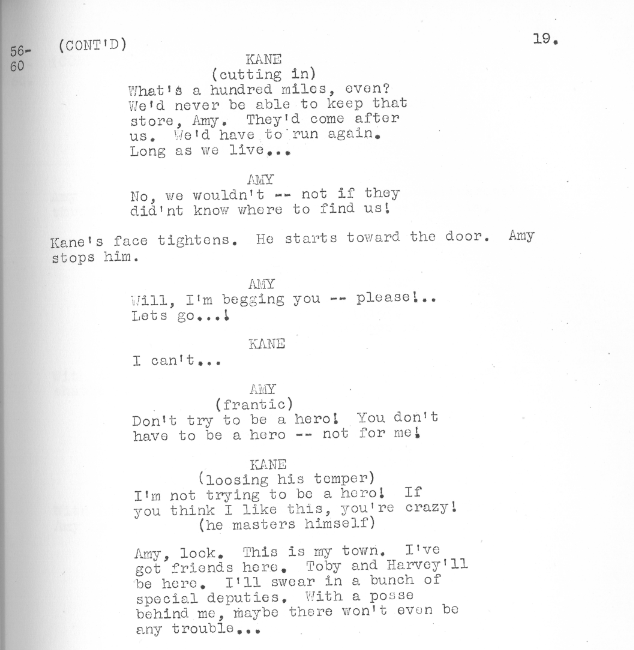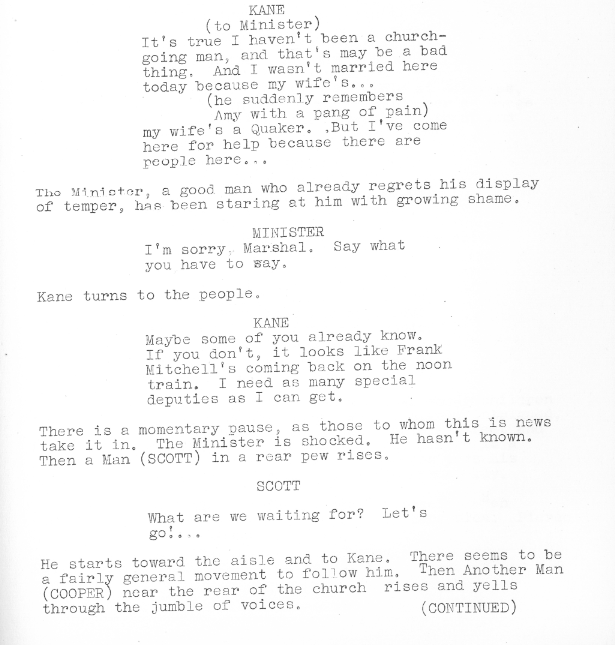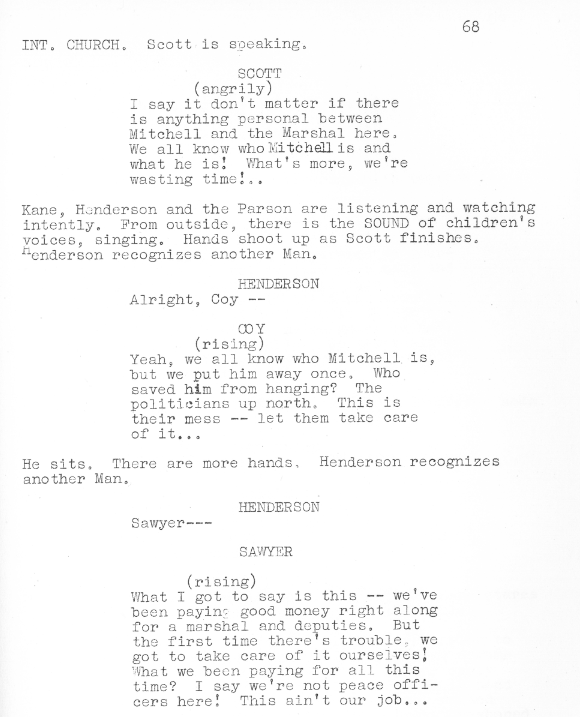SCREENPLAY 101: HIGH NOON
Here's a fun fact about HIGH NOON: U.S. Presidents love it. Eisenhower screened it three times. Clinton screened it too, and recommended it to George W. Bush, who in turn gifted Japanese prime minister Junichiro Koizumi with one of the film's original posters. (Bush was also reportedly a fan of the AUSTIN POWERS movies, and was known around the White House for his Dr. Evil impression, but that's neither here nor there).
It makes sense, if you think about it. Its one-righteous-man-against-the-world stance is applicable to just about any spot on the political spectrum; no matter what your issue is, it's easy to find some inspiration in Gary Cooper's actions throughout the film. And you don't have to be Doris Kearns Goodwin to know that the Oval Office can be a pretty lonely place.
But what's really cool about HIGH NOON - screenplay by Carl Foreman, based on the short story "The Tin Star" by John W. Cunningham, and number 75 on the WGA's list of the 101 greatest screenplays of all time - is that Cooper's character, Will Kane, is clearly terrified the entire time. People tend to remember Will as the strong, silent type - it feels like Tony Soprano mentions this about six times per season in THE SOPRANOS - but both the script and Cooper's performance make it pretty clear that Will is only keeping it together through sheer force of will.
But the reason Kane is a hero - and a political inspiration to anyone who's ever, say, looked down the barrel of a recalcitrant Congress - is because he faces the danger head-on without considering the consequences. But that's not all! He's got logic on his side, as we see on page 19. Backing down from Frank Miller just doesn't make sense.

Plus, hey! He'll have his whole running crew with him! Surely they'll have his back!
But then, of course, when he goes to rally the troops in a later scene...


(Note: Miller is referred to as Mitchell in this early draft.)
You can almost hear the sad horns from The Price Is Right as the town abandons Kane right there in the church. (You might even suspect Foreman and co-producer Stanley Kramer are making a statement about religion by setting this scene in a church. But let's not get into that right now.)
And one by one, Kane's compatriots abandon him. His friends. His deputy. Even people who promised their help earlier in the script.
And in a scene on page 91 that didn't make it into the final movie, Kane actually contemplates suicide:

...or even attempts it, based on your interpretation of the scene. Did he know the safety catch was on? Will Kane doesn't seem like a guy who would fire his gun without releasing the safety. On the other hand, he's clearly shaken by the ordeal he's about to face: One lawman against four bandits, one of whom is played by Lee Van Cleef. Those odds aren't good. You could hardly blame him for wanting to take the easy way out.
(Again, there's probably some symbolic subtext here: Foreman was called before the House Un-American Activities Committee when he was writing the script. That would make anyone feel alone, terrified, and pessimistic about the future.)
That's why HIGH NOON is a great movie, really. Our cinematic heroes are at their most relatable when they're in over their head and they know it: Han Solo's terror as he unknowingly chases two stormtroopers into a hangar full of more stormtroopers. The look that crosses Indiana Jones's face as he reaches for a gun that isn't there. Black Widow's "I don't see how that's a party" line as Iron Man leads a giant armored space eel right to her. That's how we'd feel, right?
Personally, that's why I'd love to see a version of HIGH NOON with that suicide scene. I like a Will Kane who's scared stiff. I like a Will Kane who tests out what it might be like to end his own life, rather than letting a bunch of hooligans end it for him (possibly using a much more gruesome methodology). I like a Will Kane who walks right up to the edge of the cliff before turning around to face his pursuers, rather than jump off. Don't get me wrong - in the final film, he sweats profusely as he watches the clock and makes out his will. There's no question he's scared. But there's scared, and then there's gun-in-your-mouth scared, and coming back from one isn't like coming back from the other.
Either way: No wonder presidents want to be like this guy.
The pages cited in this post are from an undated draft, but we also have a draft from August 24, 1951. Both drafts feature the "suicide" scene.
Here’s the deal: Throughout 2014, we’re posting pages from every script on the WGA’s list of the 101 Greatest Screenplays, as chosen by Guild membership, because we have every one in our library. Sure, we have other scripts that didn’t make it onto the list, either because they didn’t make the cut or because they were produced after the list was generated (presumably SHARKNADO, which we totally have a copy of, is only in the latter category).
